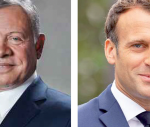You are here
Allaying Arab suspicions must follow Iran deal
Jul 14,2015 - Last updated at Jul 14,2015
Negotiators struggled in Vienna on Monday to put the final touches on an agreement that would provide a long-term framework to monitor Iran’s nuclear programme, paving the way for the removal of international sanctions on Tehran. But last minute snags continued to obstruct a deal amid hopes that a breakthrough will still happen. If an agreement is reached it would be seen as a major victory for the international community and Iran. For the United States and its partners the deal would muffle voices calling for a military strike against Iran’s nuclear facilities. It would be presented as a diplomatic achievement by the Obama administration, opening the door for possible normalisation of relations between Washington and Tehran.
For Iran’s President Hassan Rouhani, the accord would be seen as a triumph for the Iranian people and recognition of its right to develop a civilian nuclear programme. More importantly it would lift international sanctions, giving a much needed relief to the Islamic republic’s ailing economy. Despite opposition from hardliners, the deal is expected to boost the influence of moderates within Iran’s political and clerical structure.
No party to the negotiations wants to see them fail at the 11th hour. But if they do collapse the repercussions for Tehran would be dire. It would also give sceptics in Israel, the US Congress and in some Arab capitals the ammunition they need to call for a military intervention against Iran; something which President Barack Obama would like to avoid as he concludes his second term.
A deal that would end Iran’s political and economic isolation would not please most Arab countries; especially Saudi Arabia. Riyadh is suspicious of Tehran’s regional agenda and has openly accused it of meddling in Arab affairs in Yemen, Syria and Iraq. Rehabilitating Iran would give it the means it desperately needs to maintain and increase its presence in these countries, it is believed. A stronger Iran, with regional and sectarian agendas, would dramatically boost fears about its threat to Gulf national security; something that has prompted Washington to commit to providing GCC nations with an advanced missile defence system.
Added to these concerns is the fact that a deal would have to reflect on US-Iran relations and perhaps trigger a process of normalisation. Iran is still accused of backing terrorism and its role in both Syria and Iraq has been widely criticised by the West. It is thus important that the arms embargo remain in place until Iran’s regional policies are rectified. But the Arabs are right to view any détente between Washington and Tehran with suspicion, especially as historic US involvement in the Middle East lessens in favour of the so-called pivot to the Far East.
Reaction to the nuclear deal will come in many forms and shapes. For starters some GCC countries have revealed plans to launch their own civilian nuclear programmes as a way to test the West’s readiness to sustain such moves. Furthermore, Saudi Arabia, Turkey and Qatar will maintain their support of the Syrian opposition which is fighting the regime and its Iranian allies in addition to Daesh militants.
And with the absence of a political solution to Yemen’s crisis, the Saudi-led Arab coalition cannot but continue with its military operation in support of the legitimate government and to stem Iran’s ties with the Houthi rebels and deposed former president Ali Abdullah Saleh.
Saudi Arabia’s Foreign Minister Adel Al Jubeir was clear about Riyadh’s stand from Iran’s meddling in Arab affairs when he visited Amman earlier this week. He accused Tehran of standing behind aggressive acts against Arab interests over the last 35 years. But he also said that relations with Iran should be based on mutual respect and non-interference in the affairs of others.
In light of the possible nuclear breakthrough and its repercussions on the region as a whole, it would make sense to initiate some form of Arab-Iran dialogue based on the principles that Jubeir outlined. If the world community was able to negotiate a peaceful deal with Iran, why can’t Tehran assuage Arab fears and suspicions through a similar process? Naturally Saudi Arabia and its allies would need to see a sign of goodwill coming from Iran. That could happen in Yemen, where the ongoing strife appears endless, futile and without a decisive winner. The brunt of this war has been borne by the Yemeni people. A common ground for reconciliation already exists in the form of the Gulf initiative, the outcome of the national dialogue and UN resolutions. Iran could send a positive signal to its Arab neighbours by backing these points of reference and forcing the Houthi-Saleh camp to return to negotiations.
Such an important gesture could form the basis for a serious dialogue between Iran and the Arabs over other thorny issues while nullifying claims that it has a sinister agenda for the region. Other than that the rift between Iran and its neighbours will widen opening the path for all sorts of confrontations.
The writer is a journalist and political commentator based in Amman.













